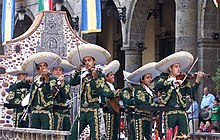Mexicanos mestizos (Spanish) | |
|---|---|
 XIII International Meeting of Mariachi and Charreria in Guadalajara, Jalisco | |
| Total population | |
| Unknown 40%–90% of the Mexican population There are no official data in the censuses | |
| Languages | |
| Predominantly Spanish | |
| Religion | |
| Majority: Roman Catholicism Minority: Protestantism | |
| Related ethnic groups | |
| Pardo Brazilians · Mestizo Colombians · Mixed Dominicans · Moreno Venezuelans · Others |
In Mexico, the term mestizo (lit. "mixed") refers to an identity of those of mixed European (mainly Spanish) and Indigenous Mexican descent. Some believe it can be defined by criteria ranging from ideological and cultural to self-identification, genetic ancestry, or physical appearance. According to these criteria, estimates of the number of mestizos in Mexico vary from about 40 percent of the population to over 90% (including Indigenous people that do not recognize themselves as part of an Indigenous culture and White Mexicans) who do not belong to the country's culturally indigenous minorities. A survey done by Latinobarometro in 2018 found that around 58% of Mexicans self-identify as mestizos when asked about their race, and another survey by Cohesión Social found that over 70% of Mexicans identified as mixed-race. Some genetic studies have claimed that mestizos make up over 93% of Mexico's present-day population, but this is disputed, with many Mexicans, including those of mixed ancestry, identifying more with static racial labels such as "white" or "indigenous" rather than mestizo, and a large number simply identifying as "Mexican," rejecting racialized labels.[1][2][3][4][5][6][7]
The meaning of the word mestizo has changed with time; it was originally used in the colonial era to refer to individuals who had one Spanish and one Amerindian parent. Although the caste system and racial classification were officially abandoned when Mexico became independent, the label mestizo was still used in academic circles to refer to people of mixed race. A mestizo ideology was created (exemplified by the José Vasconcelos essay La raza cósmica) that mestizos are the result of racial mixing, and all Mexico must become mestizo so the country could achieve prosperity. After the Mexican Revolution, the government adopted and promoted the mestizo ideology to create a unified Mexican identity with no racial distinctions. By 1930, racial identities other than "indigenous" disappeared from the Mexican census. All Mexicans who did not speak indigenous languages (including European Mexicans) were now considered mestizo, transforming a racial identity into a national one.[1]
People of different phenotypes make up Mexico's mestizo population, with many being of predominantly European or predominantly Indigenous ancestry.[5] Since the term has a number of socio-cultural, economic, racial and genetic meanings, estimates of the Mexican mestizo population vary widely. According to the Encyclopædia Britannica, which bases its estimate on the 1921 census, from one-half to two-thirds of the Mexican population is mestizo.[8] As Mexico's national identity, all Mexicans who are not indigenous and participate in the nation's culture may be considered mestizo (culturally Mexican) regardless of racial background.[1] The word had disappeared from the popular Mexican vocabulary long ago, since it had a pejorative connotation.[9] Some modern academics have challenged the mestizo concept on the grounds that census data indicates that marriages between people of different races were rare;[10] arguing that the ideology has incentivized racism rather than ending it, denying Mexico's distinct ethnic groups and cultures.[11]
- ^ a b c en el censo de 1930 el gobierno mexicano dejó de clasificar a la población del país en tres categorías raciales, blanco, mestizo e indígena, y adoptó una nueva clasificación étnica que distinguía a los hablantes de lenguas indígenas del resto de la población, es decir de los hablantes de español. Archived 2013-08-23 at the Wayback Machine
- ^ Knight, Alan (1990). "Racism, Revolution and indigenismo: Mexico 1910–1940". In Graham, Richard (ed.). The Idea of Race in Latin America, 1870–1940. Austin: University of Texas Press. pp. 73. ISBN 978-0-292-73856-0.
- ^ Bartolomé, Miguel Alberto (1996). "Pluralismo cultural y redefinicion del estado en México" (PDF). Coloquio sobre derechos indígenas. Oaxaca: IOC. p. 5. ISBN 978-968-6951-31-8.
- ^ "El impacto del mestizaje en México", "Investigación y Ciencia", Spain, October 2013. Retrieved on 01 June 2017.
- ^ a b Lizcano Fernández, Francisco (August 2005). "Composición Étnica de las Tres Áreas Culturales del Continente Americano al Comienzo del Siglo XXI" [Ethnic Composition of the Three Cultural Areas of the American Continent at the Beginning of the 21st Century]. Convergencia (in Spanish). 12 (38): 185–232.
- ^ "Informe Latinobarómetro 2018". Latinobarometro. Retrieved June 10, 2023 – via SPSS output: Image 1, Image 2.
{{cite web}}: External link in|via= - ^ Martínez-Cortés, Gabriela; Salazar-Flores, Joel; Gabriela Fernández-Rodríguez, Laura; Rubi-Castellanos, Rodrigo; Rodríguez-Loya, Carmen; Velarde-Félix, Jesús Salvador; Franciso Muñoz-Valle, José; Parra-Rojas, Isela; Rangel-Villalobos, Héctor (September 2012). "Admixture and population structure in Mexican-Mestizos based on paternal lineages". Journal of Human Genetics. 57 (9): 568–574. doi:10.1038/jhg.2012.67. ISSN 1435-232X. PMID 22832385. S2CID 2876124.
- ^ "Mexico- Ethnic groups". Encyclopædia Britannica. Retrieved 1 October 2016.
- ^ Bartolomé, Miguel Alberto (1996). "Pluralismo cultural y redefinicion del estado en México" (PDF). Coloquio sobre derechos indígenas. Oaxaca: IOC. p. 2. ISBN 978-968-6951-31-8.
- ^ Federico Navarrete (2016). Mexico Racista. Penguin Random house Grupo Editorial Mexico. p. 86. ISBN 978-607-31-4364-6. Retrieved February 23, 2018.
- ^ "El mestizaje en Mexico" (PDF). Archived from the original (PDF) on 2017-08-01. Retrieved 2017-06-20.